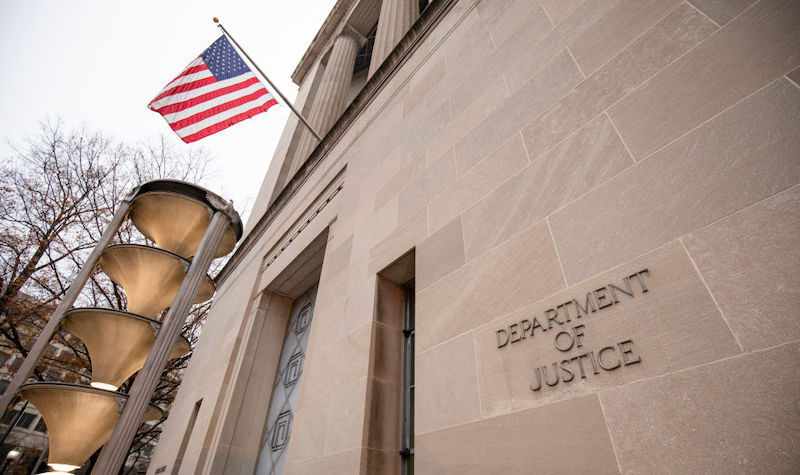
In one of the biggest antitrust cases in a generation, the Justice Department opted for a narrow claim.
Chances are Google led you to this page. If so, you are not alone. More than 90 percent of web, mobile, and in-app searches in the United States occur through Google’s search engine or the search engines of its subsidiaries, most famously YouTube.
In a new lawsuit, the U.S. Department of Justice along with 11 state attorneys general claim that Google’s market dominance is not merely the product of superior service and a better product design. Rather, the Justice Department alleges that Google has engaged in anticompetitive acts to maintain its dominance.
The Justice Department’s complaint is receiving so much attention not only because it is set to instigate one of the largest antitrust cases in modern history, but also because it touches on the increasingly politicized image of big tech. Not a single Democratic state attorney general signed the complaint—although California is now seeking to.
Some commentators contend that the government’s complaint is too narrow given the scope of Google’s antitrust violations.
Although a narrower interpretation of antitrust laws would normally be expected from a conservative administration, these are not normal times. The Trump Administration repeatedly criticized the tech industry and labeled the Democratic Party as the party of Big Tech.
The Justice Department alleges that, through agreements Google made with device manufacturers, wireless carriers, and browser developers, the company sought to solidify its status as the owner of what has become the nearly universal default search engine. Some of these agreements allegedly prohibited the other companies from dealing with Google’s competitors.
The Justice Department brought its complaint under Section 2 of the Sherman Antitrust Act, which, in certain cases, makes it unlawful for a company to “monopolize, or attempt to monopolize” trade. The Justice Department’s decision to bring its claims exclusively under Section 2 of the Act, when a number of them are also actionable under Section 1, has puzzled and concerned some commentators.
The U.S. Supreme Court has since refined the sparse language of Section 2 of the Sherman Act to require a showing of economic power within the relevant market paired with some type of exclusionary conduct—conduct that goes beyond developing a superior product, producing it more efficiently, or demonstrating business acumen in other ways compatible with the goals of a competitive market.
The lawsuit centers on whether Google engaged in exclusionary acts. The primary exclusionary acts alleged by the government are “tying” and “exclusive dealing” agreements.
According to the Federal Trade Commission, tying entails the use of “forced buying, or ‘tie-in’ sales, to gain sales in other markets … and to make it more difficult for rivals in those markets to obtain sales.” In United States v. Microsoft, the government alleged that making Internet Explorer the default web browser for users of Microsoft, and making it difficult to change web browsers, could constitute “tying” in violation of Section 1 of the Sherman Act. The Justice Department made a similar claim in its complaint against Google, but under Section 2, it argued that Google had required a preset default status and made its software undeletable.
The complaint focuses on exclusive dealing agreements, which are agreements that limit another seller from dealing with competitors. For example, Google allegedly made contracts with Android manufacturers that compelled those companies to “(1) take a bundle of other Google apps, (2) make certain apps undeletable, and (3) give Google the most valuable and important real estate on the default home screen.”
Claims of exclusive dealing can be brought under Section 1 or Section 2 of the Sherman Antitrust Act, but curiously the Justice Department decided not to pursue any Section 1 claims against Google.
The omission is also striking in light of the parallels the government is trying to establish between Google’s alleged antitrust violations and those of Microsoft 20 years ago when the government brought multiple Section 1 claims.
The decision not to bring claims under Section 1 of the Sherman Act is not the only omission from the Justice Department’s complaint. The Department also decided not to pursue claims of “self-preferencing” involving Google’s apparent practice of giving priority to its own products in its search results. Some commentators speculated that if the Justice Department had brought such claims, it would have had far wider repercussions for the tech industry as a whole.
Perhaps due to these omissions, states are initiating their own antitrust lawsuit against Google. The Biden Administration could also take a different stance to the Google suit—perhaps adding Section 1 and self-preferencing claims to the existing complaint.
The eyes of Big Tech and antitrust lawyers are keenly focused on what the coming months will bring for the lawsuit against Google.



